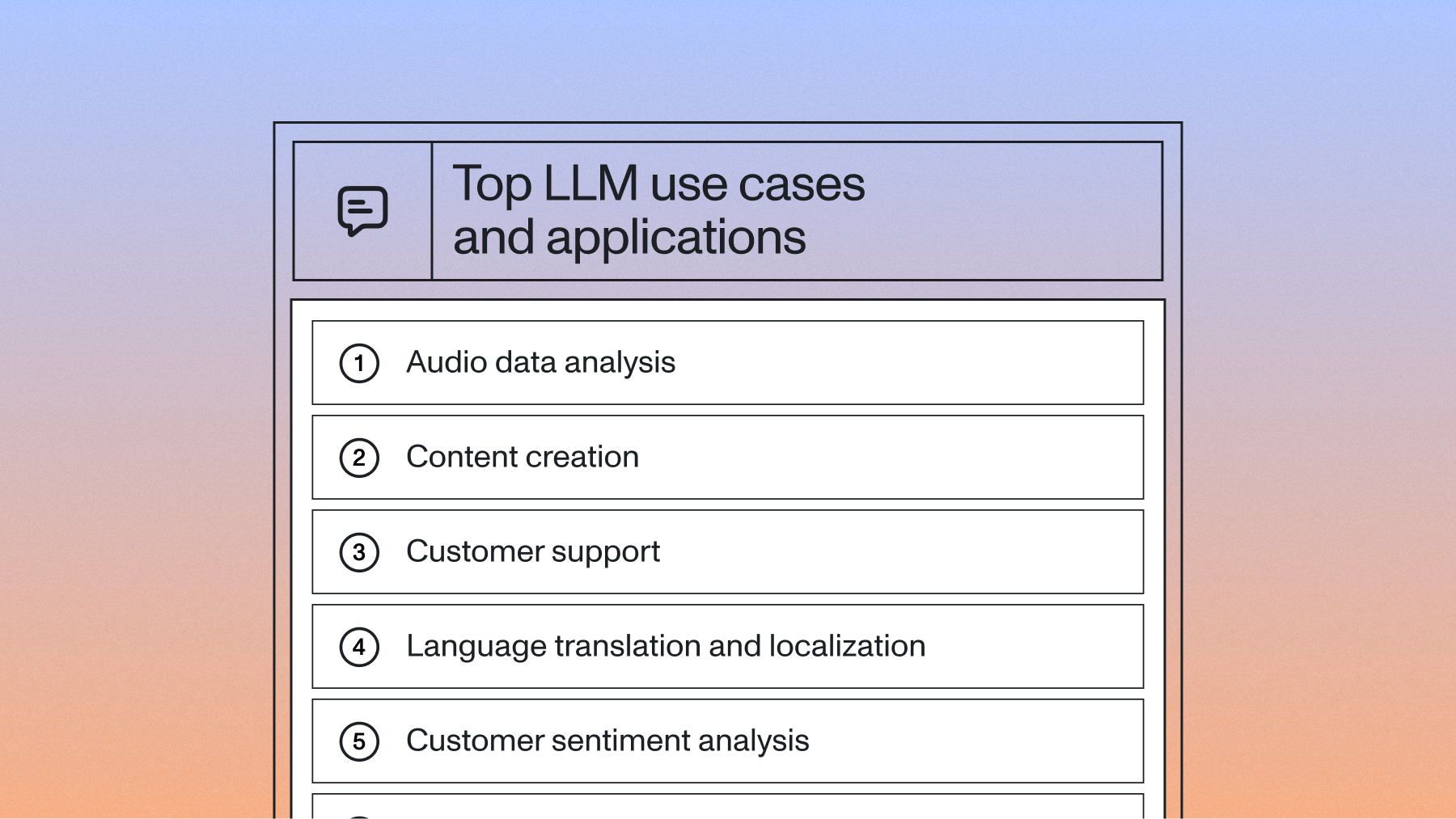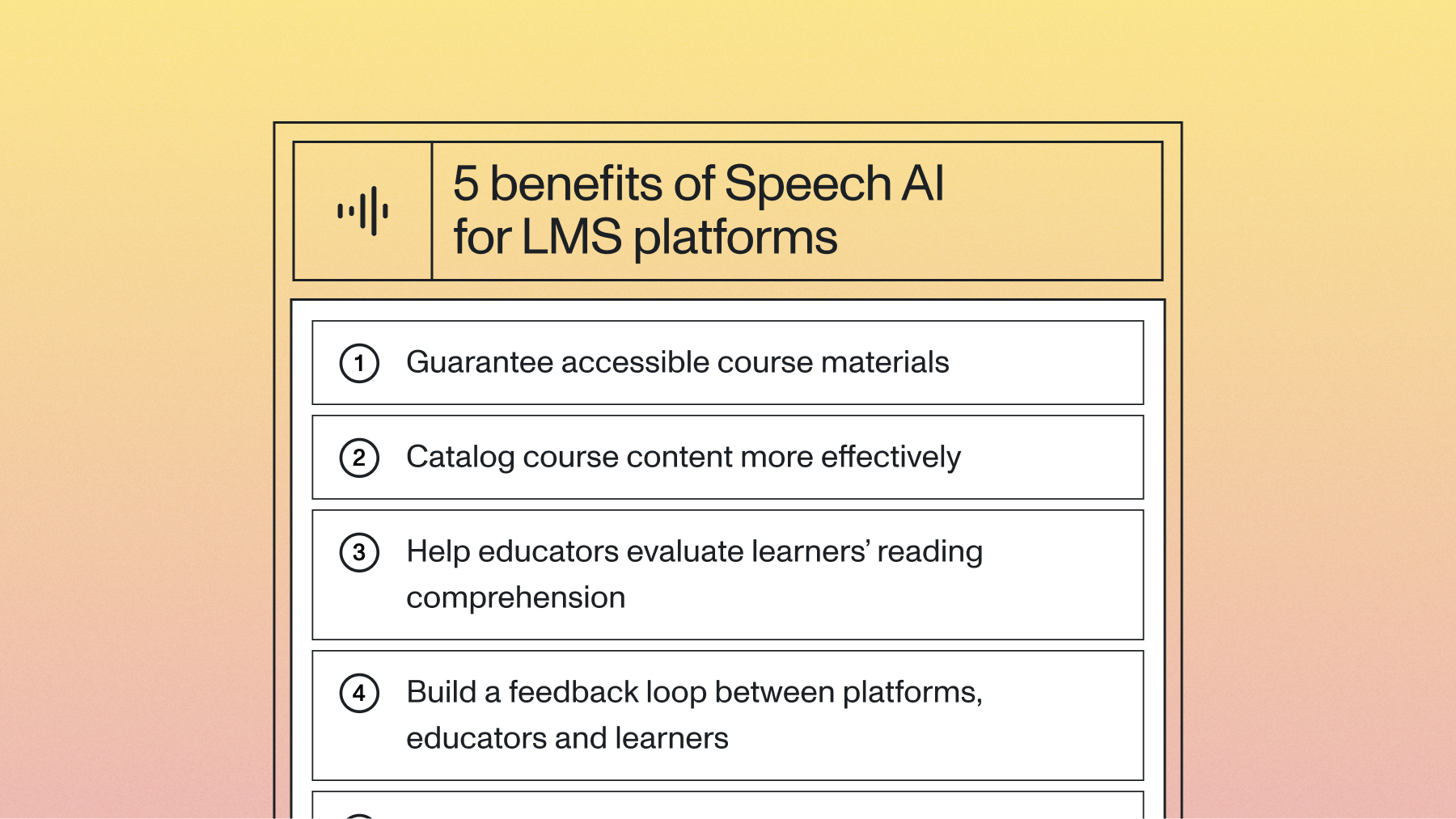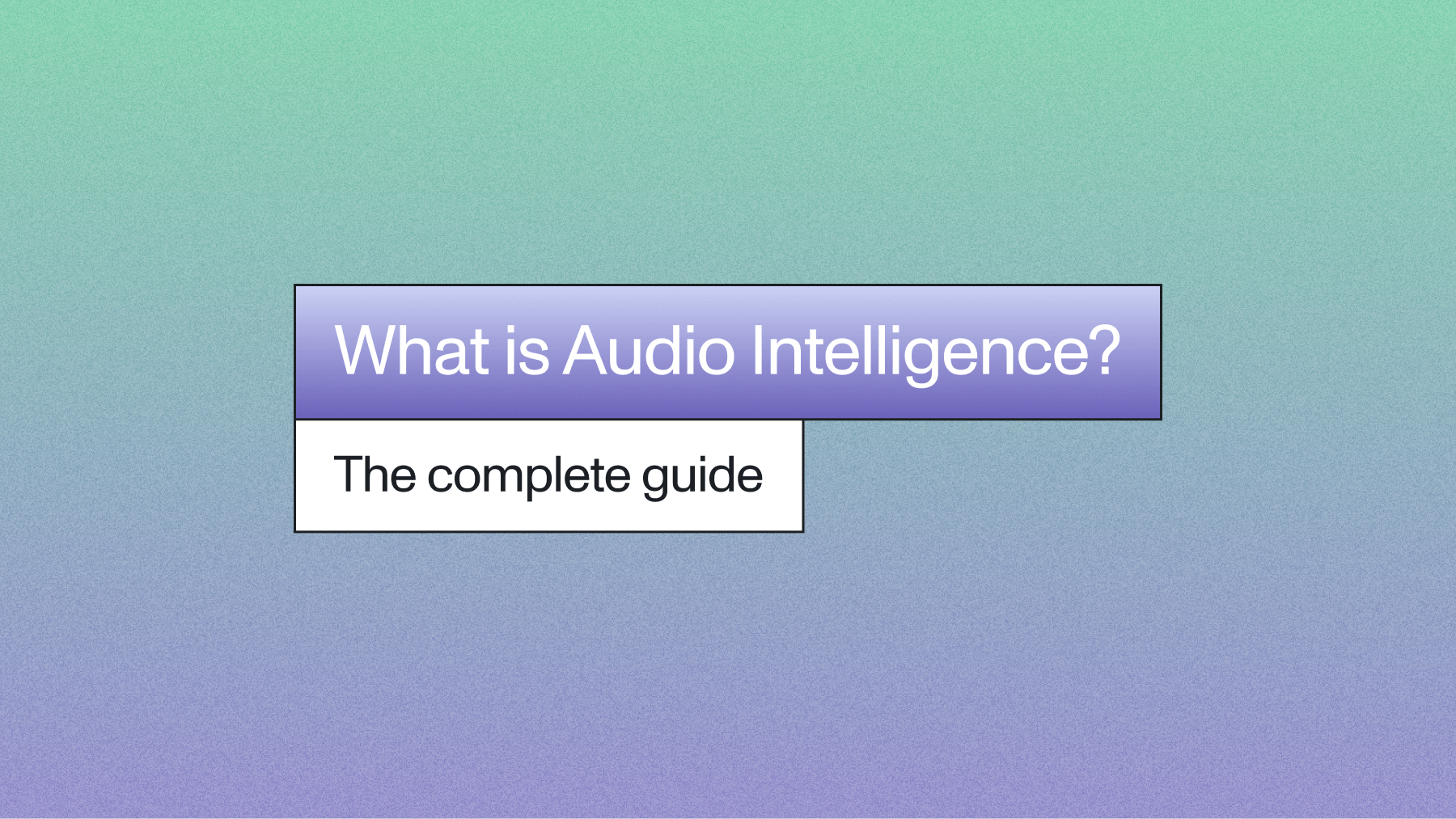How Speech AI technology can improve transcription services
Learn how to use Speech-to-Text and Speech AI technology to transform your transcription services and upgrade your offerings.



Voice AI technology is revolutionizing how businesses handle speech data, and market projections show the speech recognition technology sector is expected to reach $29.28 billion by 2026. This transformation impacts everything from transcription services to customer interactions and beyond. Traditional approaches to processing voice data struggle with scale, accuracy, and cost-efficiency. Manual transcription remains time-consuming and error-prone, while basic automated systems fail to capture the nuances of human speech, especially in challenging audio conditions or with specialized terminology.
The limitations extend beyond transcription. Businesses need comprehensive voice solutions that can understand context, detect sentiment, identify speakers, and even engage in natural conversations. Voice AI technology addresses these challenges through advanced AI models that deliver human-level accuracy while enabling entirely new capabilities like real-time voice agents and automated customer service.
This transformation impacts organizations across industries—from healthcare providers automating clinical documentation to contact centers deploying intelligent voice agents. The technology that once simply converted speech to text now powers sophisticated applications that understand, analyze, and respond to human voice in real time.
Below, we'll explore how Voice AI, also known as Speech AI, technology can transform your business applications, the core capabilities available today, implementation strategies across industries, and practical steps for getting started.
What is Voice AI technology?
Voice AI technology is a suite of AI models that converts human speech into actionable business insights. Voice AI combines speech recognition (converting speech to text), natural language processing (understanding context and meaning), and speech synthesis (generating human-like responses) to enable automated voice interactions that understand, analyze, and respond to human speech in real time.
- Speech recognition technology: Also known as speech-to-text, this technology converts spoken language into text. Modern speech recognition handles complex challenges like background noise, multiple speakers, and diverse accents with remarkable accuracy.
- Natural language processing (NLP): NLP enables systems to understand context and meaning within speech, moving beyond word-for-word transcription to grasp intent, sentiment, and nuance in human communication.
Today's Voice AI platforms offer far more than basic transcription. Advanced models provide comprehensive speech understanding capabilities:
- Speaker diarization: Identifies and differentiates between multiple speakers in a conversation, essential for meeting transcriptions, interviews, and call center analytics.
- Sentiment analysis: Analyzes emotional tone and attitudes expressed in speech, helping businesses understand customer satisfaction and engagement levels.
- Auto chapters: Automatically segments audio into topical sections, making long-form content easily navigable and searchable.
- PII redaction: A key Safety Guardrail that detects and removes personally identifiable information from transcripts, ensuring compliance with privacy regulations like GDPR and HIPAA.
- Entity detection: Identifies and extracts key information like names, locations, dates, and monetary values from speech.
- Real-time processing: Enables live transcription and analysis for applications requiring immediate response.
Voice AI applications beyond transcription
Voice AI applications extend far beyond transcription to drive measurable business outcomes. Modern platforms enable automated customer service, real-time voice analytics, and intelligent conversation management that reduces costs while improving customer satisfaction.
Conversational AI agents
Voice AI powers intelligent agents that engage in natural conversations with customers. In fact, recent findings show that using AI agents can cut business costs by up to 67% while improving efficiency by 103%. Unlike rigid menu trees, conversational agents understand natural language and maintain context throughout complex interactions.
Voice synthesis and generation
Modern TTS technology has evolved dramatically, producing natural-sounding voices that capture rhythm and emotion, making them nearly indistinguishable from human speech. Businesses use voice synthesis for automated notifications, content narration, and creating consistent brand voices across customer touchpoints. Some platforms even offer voice cloning capabilities, allowing companies to scale personalized messaging while maintaining strict ethical guidelines and consent requirements.
Real-time voice analytics
Voice AI enables immediate analysis of live conversations, providing instant insights that drive better outcomes. Sales teams receive real-time coaching during calls, customer service agents get instant knowledge base suggestions, and compliance teams monitor conversations for regulatory adherence as they happen. This real-time intelligence transforms voice from a retrospective data source into an active business tool.
Speech understanding at scale
Modern Voice AI platforms apply sophisticated models to extract structured insights from unstructured voice data. This includes topic modeling to understand discussion themes, intent detection to identify customer needs, emotion recognition to gauge satisfaction, and comprehensive summarization that distills hours of audio into actionable intelligence. These capabilities transform voice data from an archive into a strategic asset.
8 business benefits of Voice AI implementation
Voice AI delivers measurable improvements across operational efficiency, customer experience, and business intelligence. Organizations implementing these technologies report transformative benefits that extend well beyond cost savings.
1. Enhanced accuracy and consistency
Voice AI achieves superior accuracy compared to manual processes or basic automated systems. Models like AssemblyAI's Universal model, trained on vast multilingual audio datasets, handle complex scenarios including background noise, technical terminology, accents, and overlapping conversations. For use cases requiring the highest possible accuracy on English audio, specialized models like Slam-1 are also available. This consistency matters especially in regulated industries where accuracy directly impacts compliance and customer outcomes.
2. Unlimited scalability
Voice AI systems operate continuously without fatigue, processing unlimited concurrent streams while maintaining consistent quality. This scalability enables businesses to handle fluctuating volumes—from normal operations to sudden spikes in demand—without compromising service levels or accuracy. Organizations can grow their voice processing capabilities instantly without hiring, training, or managing additional staff.
3. Operational cost optimization
While Voice AI requires initial technology investment, it dramatically reduces ongoing operational costs, with one health study reporting annual savings of approximately $334,000 from using speech recognition in an emergency department. Automated voice processing eliminates the need for large transcription teams, reduces quality assurance overhead, and minimizes error-related rework. Companies maintain or improve their margins while offering more competitive pricing to customers.
4. Global market reach
Voice AI's multilingual capabilities open new geographic markets without the traditional barriers of language expertise. Modern platforms like AssemblyAI's Universal model support over 90 languages, while accurately recognizing regional accents and dialects. This global capability allows businesses to serve diverse customer bases without building separate infrastructure for each market.
5. Industry-specific customization
Voice AI adapts to specialized vocabularies and industry requirements through customization and training. Legal firms ensure accurate capture of legal terminology, healthcare providers handle medical terms and drug names correctly, and technical support centers recognize product names and technical jargon. This adaptability makes Voice AI valuable across every industry vertical.
6. Enterprise-grade security and compliance
Modern Voice AI platforms incorporate robust security measures and maintain compliance with international standards. Systems support GDPR, HIPAA, and other regulatory requirements through features like automatic PII redaction, encrypted processing, and detailed audit trails. This security infrastructure gives businesses confidence when handling sensitive voice data.
7. Real-time processing capabilities
Real-time Voice AI through Streaming Speech-to-Text enables entirely new application categories:
- Live event captioning and accessibility services
- Real-time translation for global communications
- Instant meeting transcriptions with speaker identification
- Live clinical documentation during patient encounters
- Real-time coaching for sales and service calls
- Immediate compliance monitoring and alerting
- Interactive voice response with natural language understanding
8. Universal accessibility
Voice AI makes content and services accessible to diverse audiences with varying needs:
- Hearing accessibility: Automatic captioning and transcription ensure people with hearing impairments can access audio content and participate in voice-based interactions.
- Learning preferences: Written transcripts of audio content cater to visual learners and those who process information more effectively through reading.
- Media accessibility: Automated subtitles and captions make video content accessible to broader audiences, improving engagement and reach.
- Enhanced user experience: Features like speaker identification, emotion detection, and automatic summarization add valuable context that improves understanding and usability.
Industry-specific Voice AI strategies and ROI
Voice AI delivers distinct value across industries, with implementation strategies tailored to specific operational challenges and regulatory requirements. Leading organizations are seeing measurable returns through targeted applications that address their unique needs.
Healthcare: Clinical documentation and patient engagement
Healthcare organizations achieve significant reductions in administrative tasks through Voice AI deployment. A longitudinal study in radiology, for example, found that speech recognition reduced report turnaround times by 81%. Ambient clinical documentation automatically captures patient conversations, eliminating hours of manual note-taking.
Primary applications include:
- Clinical documentation: Automatic transcription and visit summarization
- Patient portals: Voice-enabled appointment scheduling and test result access
- Telehealth support: Real-time transcription and automated documentation
Financial services: Compliance and customer intelligence
Financial institutions dramatically reduce compliance costs through automated Voice AI monitoring. In some case studies, a manual process that once took 50 days was reduced to just hours. Voice analytics identify customer churn risk with 85% accuracy, enabling proactive retention strategies.
Key applications include:
- Compliance monitoring: Automatic detection of disclosure violations and regulatory issues
- Customer intelligence: Sentiment analysis for churn prediction and upsell identification
- Market analysis: Earnings call transcription and insight extraction for trading decisions
Contact centers: Automation and agent augmentation
Contact centers transform operations through Voice AI-powered automation and intelligence, and in a recent survey, 69% of companies cited improved customer service after implementing conversation intelligence. Companies like CallSource use Voice AI to analyze customer calls at scale, automatically scoring agent performance and identifying trends without manual review. Intelligent voice agents handle routine inquiries, freeing human agents for complex issues. Real-time transcription and sentiment analysis provide agents with instant context and suggested responses, improving first-call resolution rates.
Lorem ipsum dolor sit amet, consectetur adipiscing elit, sed do eiusmod tempor incididunt ut labore et dolore magna aliqua. Ut enim ad minim veniam, quis nostrud exercitation ullamco laboris nisi ut aliquip ex ea commodo consequat. Duis aute irure dolor in reprehenderit in voluptate velit esse cillum dolore eu fugiat nulla pariatur.



%20is%20Being%20Used%20Today.png)

